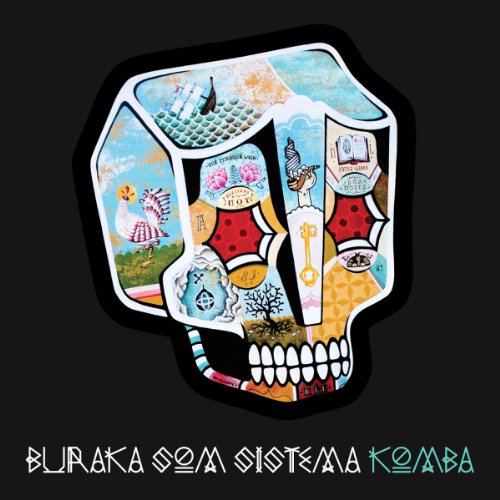
Buraka Som Sistema
Komba
Release Date: Nov 8, 2011
Genre(s): Electronic, Rap, Club/Dance, Underground Rap
Record label: Enchufada
Music Critic Score
How the Music Critic Score works
Buy Komba from Amazon
Album Review: Komba by Buraka Som Sistema
Very Good, Based on 7 Critics
Based on rating 8/10
Spare. Dark. Relentless. On Komba, the second album from Portuguese dance collective Buraka Som Sistema, fierce club beats propel everything forward like time’s ever-rolling stream bears us all away. Buraka don’t do pretty melodies, sweeping synth riffs or major keys. They don’t do much in ….
Based on rating 3.5/5
African music has been so heartily embraced by today’s indie world that it’s hard to even remember the old days of scratchy field recordings, obscure French record labels, and sheets of liner notes written by Western ethnomusicologists. These days, African street musicians roll with Western indie rockers, and musicheads in the US and abroad are influenced by a whole slew of new sounds coming out of Africa. Buraka Som Sistema are a microcosm of this new system of musical dissemination.
Based on rating 7/10
Komba, as a voice-over early in Buraka Som Sistema's so-titled sophomore album helpfully explains, is an Angolan religious tradition that's roughly the equivalent of an Irish wake: a massive party held a week after a death, celebrating the life of the deceased. The accordingly spooky and festive title track, which is primarily sung in English (and, in part, as though from beyond the grave), together with several references to Bantu tribal rituals in the opening "Eskeleto" (Skeleton), sets up the notion that the album will be something of a cultural guided tour. But save, perhaps, for the ominous, drum-driven instrumental "Macumba" (whose title refers to Afro-Brazilian folk religion), there's no other indication here (at least to Anglophones) that Portugal's Kuduro champions have any such edificatory intentions in mind: for all practical purposes, Komba is "conceptual" only in that -- as could only be expected -- it's just one hell of a party.
Based on rating 3.5/5
‘[b]Komba[/b]’ is an Angolan ritual, and not one you’d particularly hanker to be the subject of. You’re dead, basically, and all your friends are celebrating your life with a boogie to your favourite song. Which is nice, but you’re, y’know, still… dead. This is the subject of the second album from Portugal’s [b]Buraka[/b], who blend a traditional African sound, kuduro, with techno and, inevitably, dubstep.
Opinion: Excellent
Atlas Sound It’s getting harder to tell the difference between Bradford Cox’s two recording projects. Deerhunter, his band, used to be noisier, sometimes punkier and sometimes more abstract; Atlas Sound, his solo recordings, used to be dronier and spacier. But at this point his recordings have converged on what they share: a foundation of four-chord 1960s rock that he floods with echoes, reverb and background noise, competing with his voice and instruments.
Opinion: Excellent
For its sophomore effort Buraka Som Sistema created a consistent dance album staying true to the kuduro sound that spiked its recognition as an official party starter. Komba features 12 tracks of non-stop dance music equipped with just about every instrument one could imagine. The band has perfected the kuduro sound that originated in Luanda, Angola, and literally translates to mean “hard ass”—hard ass beats in Buraka’s case.
Opinion: Excellent
The Portugal-based Buraka Som Sistema project started out as a collective of smart producers looking to delve into the massive umbrella of pop music and now the experiment has blossomed into a unified band. They spent much of their recent time relentlessly touring in support of their successful debut, Black Diamond, and now after a much-needed incorporation of new sounds, they offer their latest release, Komba. A Komba is an Angolan religious ritual where friends and family gather, seven days after the passing of a loved one, to celebrate their life.
'Komba'
is available now

